|
|
 |
Fiche d'espèce de Copépode |
|
|
Calanoida ( Ordre ) |
|
|
|
Spinocalanoidea ( Superfamille ) |
|
|
|
Spinocalanidae ( Famille ) |
|
|
|
Spinocalanus ( Genre ) |
|
|
| |
Spinocalanus brevicaudatus Brodsky, 1950 (F,M) | |
| | | | | | | Syn.: | Spinocalanus longicornis : Sars, 1901 a (1903) (p.22, figs.F);
S. abyssalis : ? Farran, 1908 b (p.27, Rem.); With, 1915 (p.69, figs.F,M, juv.); Sars, 1903 (p.157, figs.M); Rose, 1933 a (p.84, figs.F,M); Jespersen, 1934 (p.51); 1940 (p.16); Tanaka, 1937 (part., p.253, figs.M); Davis, 1949 (part., p.21, figs.F); ? Tanaka, 1960 (p.36, Rem.); Grice & Hulsemann, 1965 (p.229, fig.F);
Spinocalanus major Esterly, 1906 a (p.55, Rem.F); Sewell, 1948 (p.555, 562); in CalCOFI regional list (MDO, Nov. 2013; M. Ohman, comm. pers.);
S. pseudospinipes (F) Brodsky, 1950 (1967) (part., p.128, figs.F, no M); ? Deevey & Brooks, 1977 (p.256, Table 2,Rem.: p.287); S. sp. Brodsky, 1950 (1967) (p.131, fig.M);
? S. similis profundalis (F) Brodsky, 1955 a (part., p.185, figs.F, no M); ? S. terranovae : Mazzocchi & Ianora, 1991. | | | | Ref.: | | | Brodsky, 1950 (1967) (p.136, figs.F,M, Rem.); Semenova, 1962 (p.1571, figs.F,M, Rem.); Park, 1970 (p.485, Rem.); Damkaer, 1975 (p.53, figs.F, M, Rem.); Roe, 1975 (p.300, figs.M, Rem.); Gardner & Szabo, 1982 (p.192, figs.F,M); Brodsky & al., 1983 (p.278, figs.F,M); Mazzocchi & al., 1995 (p.209, figs.F,M, Rem.); Bradford-Grieve & al., 1999 (p.878, 914, figs.F,M); Bode & al., 2017 (p.600, Table I, III, fig. 2, 3, 4, morphology vs genetic). | 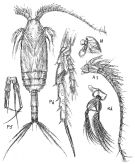 issued from : Sars G.O. in An Account of the Crustacea of Norway. Vol. IV. Copepoda Calanoida. Published by the Bergen Museum, 1903. [Suppl. Pl.III]. As Spinocalanus abyssalis. Male.
|
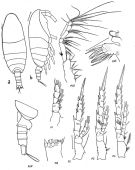 issued from : Brodsky K.A., Vyshkvartseva N.V., Kos M.S. & Markhaseva E.L. in Opred. Faune SSSR, 1983, 135. [p.279, Fig.131]. Female: a, habitus (dorsal view); b, idem (right side); Gnb= first inner lobe of Mx1; Md = masticatory edge of Md; Abd = distal end of prosome and urosome.
|
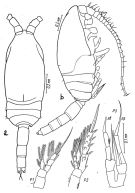 issued from : Brodsky K.A., Vyshkvartseva N.V., Kos M.S. & Markhaseva E.L. in Opred. Faune SSSR, 1983, 135. [p.280, Fig.132]. Male: a, habitus (dorsal view); b, idem (right side). lb = left; np = right.
|
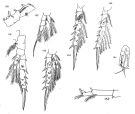 issued from : D.M. Damkaer in NOAA Technical Report NMFS CIRC-391, Seattle, 1975. [p.54, Fig.130-136, p.63, Fig.157]. Female: 130, basipod segments 1 and 2 of Mxp; 131, P2; 157, terminal segments of A1. Male: 132, P1 (left); 133, P2 (left); 134, P3 (left); 135, P4 (left); 136, P5.
|
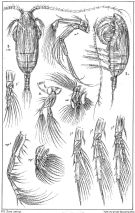 issued from : G.O. Sars in An Account of the Crustacea of Norway. Vol. IV. Copepoda Calanoida. Published by the Bergen Museum, 1903. [Pl. XII]. As Spinocalanus longicornis. Female. M = Md; m = Mx1; mp1 = Mx2; mp2 = Mxp.
|
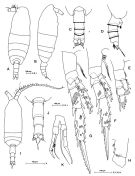 Issued from: M.G. Mazzocchi, G. Zagami, A. Ianora, L. Guglielmo & J. Hure in Atlas of Marine Zooplankton Straits of Magellan. Copepods. L. Guglielmo & A. Ianora (Eds.), 1995. [p.211, Fig.3.38.1]. Female: A, habitus (dorsal); B, idem (lateral right side); C, urosome (dorsal); D, idem (lateral right side); E, P1; F, P2; G, P3; H, basipod 1 and 2 of P4. Nota: Proportional lengths of urosomites and furca 37:17:16:19:11 = 100. Male: I, habitus (dorsal); J, urosome (dorsal); K, P5. Nota: Proportional lengths of urosomites and furca 11:35:20:21:3:10 = 100.
|
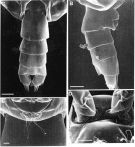 Issued from: M.G. Mazzocchi, G. Zagami, A. Ianora, L. Guglielmo & J. Hure in Atlas of Marine Zooplankton Straits of Magellan. Copepods. L. Guglielmo & A. Ianora (Eds.), 1995. [p.211, Fig.3.38.2]. Female (SEM preparation): B, urosome (lateral right side); C, idem (dorsal); D, forehead (ventral).
|
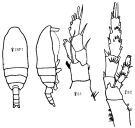 Issued from : K.A. Brodskii in Calanoida of the Far Eastern Seas and Polar Basin of the USSR. Opred. Fauna SSSR, 1950, 35 (Israel Program for Scientific Translations, Jerusalem, 1967) [p.128 , Fig.46]. As Spinocalanus pseudospinipes. Female: habitus (dorsal and lateral right side); S1, P1; S2, P2. NP = northern part of Pacific Ocean). Nota: Distal segment of exopod of P1 without spines on posterior surface. Terminal thoracic segment more smoothly-rounded in lateral view.
|
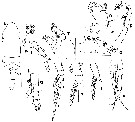 issued from : H.S.J. Roe in Bull; Br. Mus. (Nat. Hist.) Zool., London, 1975, 28 (7). [p.299, Fig.1]. Male (Cape Verde Islands): k, habitus (dorsal); l, A2; m, mandibular palp; n, Mx1; o, Mx2; ; p, Mxp; q, P1; r, P2; s, P3; t, P4; u, P5. Nota : Cephalothorax just over twice as long as the 5-segmented abdomen.
Head and 1st thoracic segment fused, 4th and 5th fused.
A1 22-segmented (without spines on the 1st segment), reaches to the hind edge of the 2nd abdominal segment.
The three inner lobes of Mx1 bear very rudimentary short setae.
The outer edge spine of the 1st exopodite segment of P1 is short.
P5 reaches back to the hind edge of the 2nd abdominal segment.
|
 issued from : C. With in The Danish Ingolf-Expedition, 1915, III (4). [p.70, Text-Fig.15, a-c]. As Spinocalanus abyssalis. Female (from 63°30'N, 54°25'W): a, last thoracic segments and urosome (lateral, left side). Male: lateral thoracic corner (lateral); c, P5 (anterior).
|
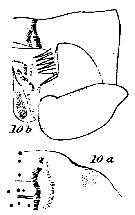 issued from : C. With in The Danish Ingolf-Expedition, 1915, III (4). [Pl. I, 10a, 10b]. As Spinocalanus abyssalis. Female: 10a, oral surface of the labrum; 10b, lamina labialis. Nota: Labrum : in front of the hinder margin in the middle a transverse row of long bristles is observed, but here none along the margin proper; laterally a series of short setae is observed (10a), and in front of these, partly on the oral surface, a group of short spines or granules is observed. Orally we find on each side an inner and an outer series of delicate bristles, arranged in a xhort posterior and a long anterior division. As far as the structure of the labium etc. is concerned (10b).
|
 Issued from : M. Bode, S. Laakmann, P. Kaiser, W. Hagen, H. Auel & A. Cornils in J. Plankton Res., 2017, 39 (4). [p.604, Table I]. Species identified via morphological and molecular analyses, including the number of specimens used for each identification method (MI: morphological identification, COI: cytochrome c oxydase subunit I gene fragment, MS: MALDI-TOF analysis, 18 S: ribosomal 18 S gene fragment). Cryptic lineages were revealed only after molecular analysis. Sampling depth, latitude, total length (TL) and Prosome/Urosome ratio (Pr:Ur) of taxon were recorded. morphological characters are only listed here, if the identification was ambiguous due to missing body parts or if cryptic or pseudocryptic lineages were revealed during molecular analyses. For diagnostic character of species refer to the references: Park, 1970; Grice, 1971; Damkaer, 1975; Schulz, 1989, 1996. C = coxa; B = basis; P = swimming legs; Exp = exopod.
| | | | | Ref. compl.: | | | Park, 1970 (p.475); Shih & al., 1971 (p.151); Vives, 1982 (p.290); Roe, 1984 (p.356); Shih & Marhue, 1991 (tab.3); Razouls & al., 2000 (p.343, Appendix); Galbraith, 2009 (pers. comm.); Medellin-Mora & Navas S., 2010 (p.265, Tab. 2) | | | | NZ: | 14 | | |
|
Carte de distribution de Spinocalanus brevicaudatus par zones géographiques
|
| | | | | | | | | | | | | Loc: | | | sub-Antarct. (SE Pacif.), E Atlant. (3°N-25°S), SE Atlant., Namibia, Cape Verde Is., ? Mauritania, off W Cabo Finisterre, Caribbean Sea, Caribbean Colombia, G. of Mexico, ? Station "S" (32°10'N, 64°30'W), Newfoundland, Strait of Davis, S Iceland, NE Atlant., W Ireland, S Norway Sea, North Sea, W Indian, Japan, Pacif. (N & central), British Columbia, California, G. of California, off N Marquesas Is., Straits of Magellan | | | | N: | 26 | | | | Lg.: | | | (7) F: 1,86-1,73; M: 1,63; (8) M: 1,44-1,29; (13) F: 2,4-1,4; M: 1,9-1,5; (17) F: 1,6; (22) F: 1,86-1,6; M: 1,6; (36) F: 1,8-1,55; M: 1,57; (65) F: 1,6; (128) M: 1,62; (131) M: 1,72-1,3; (1252) F: 1,31-1,72; {F: 1,31-2,40; M: 1,29-1,90}
(1252) F: 2,7-3,9. | | | | Rem.: | méso à abyssopélagique.
Sampling depth (sub-Antarct.) : 500-4000 m.
Des confusions entre cette espèce et S. abyssalis rendent certaines localisations géographiques incertaines.
Voir aussi les remarques en anglais | | | Dernière mise à jour : 25/03/2020 | |
|
|
 Toute utilisation de ce site pour une publication sera mentionnée avec la référence suivante : Toute utilisation de ce site pour une publication sera mentionnée avec la référence suivante :
Razouls C., Desreumaux N., Kouwenberg J. et de Bovée F., 2005-2026. - Biodiversité des Copépodes planctoniques marins (morphologie, répartition géographique et données biologiques). Sorbonne Université, CNRS. Disponible sur http://copepodes.obs-banyuls.fr [Accédé le 13 janvier 2026] © copyright 2005-2026 Sorbonne Université, CNRS
|
|
 |
 |














